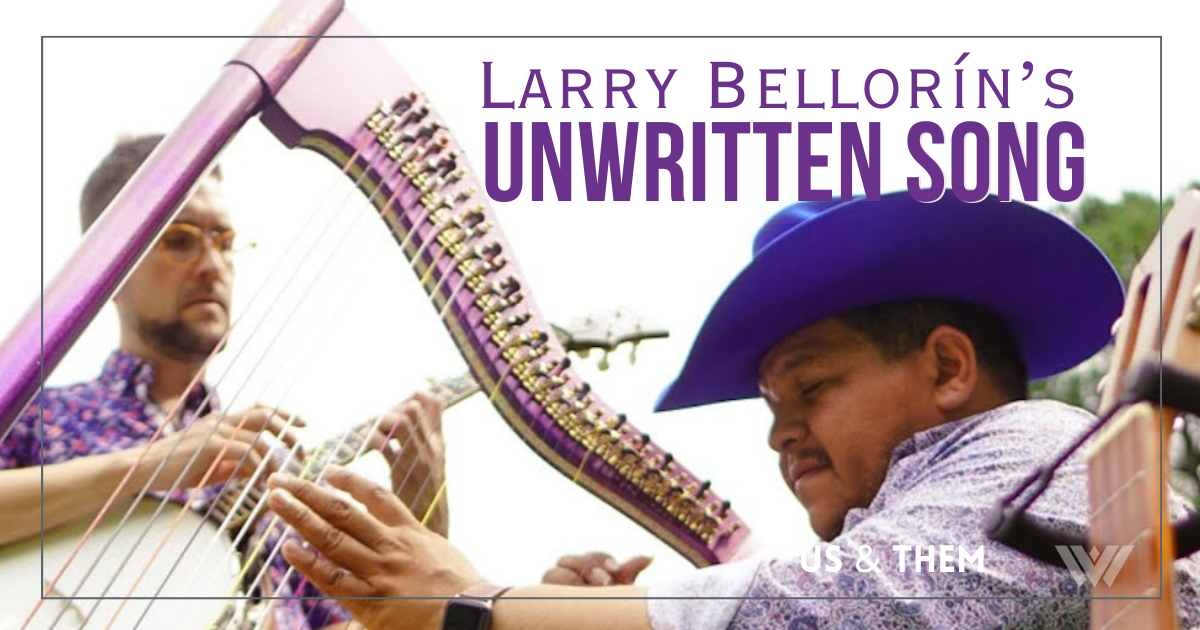Larry Bellorín began making his living as a musician and music teacher when he was a teenager in Venezuela. His career was interrupted abruptly in 2013 when Venezuela’s state-run economy crashed and socialist President Nicholas Maduro cracked down on opponents and folks like Larry, who refused to choose sides. He and his family fled to Raleigh, North Carolina and have added their names to a huge backlog of asylum applicants.
Larry worked construction and thought his musical career was behind him until he met Joe Troop, a GRAMMY-nominated musician and North Carolina native who introduced him to the folk music and traditions of Appalachia, which Larry found eerily similar to the joropo he played in Venezuela.
Their duo, Larry & Joe, is the realization of a dream for both musicians. It’s also a reminder for Larry of what – and who – he had to leave behind.
Us & Them host Trey Kay tells the story of Larry Bellorín’s musical beginnings, his “magical” kinship and duo with Joe Troop and the song he can’t yet bring himself to sing.
This episode of Us & Them is presented with support from the West Virginia Humanities Council and the CRC Foundation.
Subscribe to Us & Them on Apple Podcasts, NPR One, RadioPublic, Spotify, Stitcher and beyond.
Larry grew up in a little country town in the eastern state of Monagas, Venezuela. To make money, he’d head into the nearby city of Punta de Mata and shine shoes, singing while he worked.
“I was about ten or 11 years old, and I would go to where people were playing billiards. I’d go to the plaza where people already knew me,” Larry said. Larry speaks only Spanish and Joe Troop, who performs with Larry as Larry & Joe, translated with Us & Them host Trey Kay.
Credit: Amy Eddings
Enter Joe Troop, who introduced Larry to Bluegrass.
“He didn’t even realize where he was in the United States. He thought that this music was played in the ‘Wild, Wild West,’” Troop explained to Us & Them host Trey Kay. “He imagined it was played in Texas because since he was in the United States, all he had done was lift cinder blocks and work, and work and work and work. He had never been off a construction site. And I was like, ‘I cannot wait to show him he’s in the heart of string band country! He’s a string musician!’ And then, I was just like, ‘I know this is gonna blow his mind.’”
Credit: Billie Wheeler
Credit: Gustavo Rattia
In this video clip, Bellorín explains how everything — even culture — became politicized under Chávez and his successor Nicholás Maduro.
Credit: Amy Eddings
“I’ve seen trumpets and saxophones and keyboards and cellos and electric guitars and steel guitars. I mean, just everything mixed in with ‘Old-time.’ Why not the maracas and the harp?” Trace Carter pondered this while reflecting on Larry & Joe‘s performance at the Clifftop Festival in the summer of 2022. “I mean, why haven’t we seen these before? And it was such a wonderful addition… Everyone was in awe of their music. No one wanted them to stop. If they had played all night long, I don’t think anyone would have left.”
Credit: Mauro Ruiz
Credit: Ruby Lichte Powers
Credit: Trey Kay/West Virginia Public Broadcasting
Credit: Amy Eddings
However, in this video clip, Bellorín recalls a time when his immersion into Appalachia’s Bluegrass and Old-time scene wasn’t so easy or pleasant. The Venezuelan immigrant does stand out at festivals, which are overwhelmingly white. And there are traditionalists who aren’t as thrilled to hear Latin American instruments playing alongside fiddles and banjos.
Credit: Amy Eddings
Click here for a list of upcoming concert dates.
Click here to hear their single, “Nuevo South Train.”
Credit: Tommy Coyote
Editor’s note, June 8, 2023: The initial version of this story incorrectly stated the ages of Larry Bellorin and Joe Troop. That error has been corrected.
